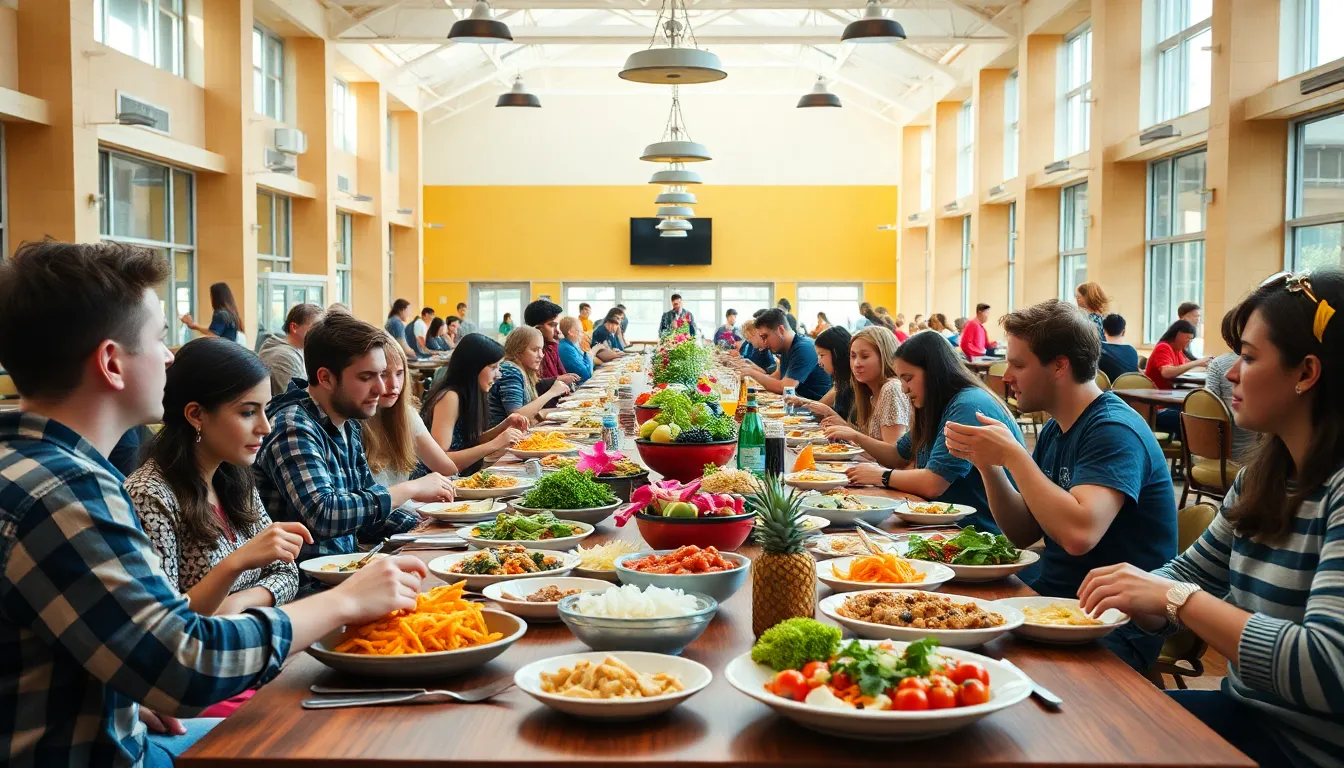Table of Contents
ToggleCollege dining halls often get a bad rap. They’re infamous for their mystery meat and questionable pizza choices, but they’re also the heart of campus life. Picture this: a bustling space where students gather, swap stories, and fuel up for late-night study sessions. It’s more than just a meal; it’s a rite of passage, a social experiment, and sometimes a culinary adventure that even Gordon Ramsay would raise an eyebrow at.
From late-night snack runs to themed dinner nights, college dining halls serve up a unique blend of flavors and experiences. Sure, the food might not always be Michelin-star quality, but the camaraderie and late-night laughs make every bite worth it. So grab a tray and dive into the quirky world of college dining; it’s an experience that’s sure to spice up the college journey.
Overview of College Dining Halls
College dining halls serve as essential focal points for campus life. They’re not only places for meals but also venues for social interaction. Students enjoy a wide range of food options, from standard cafeteria fare to themed meal events. Many dining halls now embrace dietary preferences, offering vegetarian, vegan, and gluten-free selections. Flexibility in meal plans caters to various dietary needs.
Atmosphere in these dining halls often promotes community. Students gather to share stories, study, and forge friendships over food. Events like late-night snack sessions and international cuisine nights encourage participation and enhance the dining experience.
Innovation in dining services has transformed some hall offerings. Many schools collaborate with local farms to source fresh ingredients. Others implement sustainability practices, reducing waste and promoting eco-friendly initiatives. Variety within menus often reflects student feedback, ensuring that favorites remain available.
Meal swipes provide an organized system for accessing dining services. These structured plans accommodate busy schedules, allowing students to grab meals on the go. Additionally, dining halls often utilize technology, enabling mobile ordering and menu tracking.
Overall, college dining halls play a critical role in shaping daily life on campus. They balance nutrition, sustainability, and social interaction, making them a valuable part of the student experience.
Quality of Food

College dining halls often receive criticism for their food quality, yet many institutions are re-evaluating their offerings to enhance student satisfaction.
Freshness and Variety
Students enjoy a range of menu items featuring locally sourced ingredients. Many dining halls now focus on seasonal produce, ensuring meals are fresh and flavorful. Options include international cuisine, comfort food, and healthier selections. Rotating menus keep the food exciting, as they introduce students to new flavors each week. Additionally, some dining services partner with local farms to guarantee that ingredients remain as fresh as possible. Choices accommodate both individual preferences and cultural tastes, illustrating a commitment to culinary diversity.
Dietary Restrictions
Accommodating dietary restrictions has become a priority in college dining services. Many dining halls provide ample vegetarian, vegan, and gluten-free options, ensuring students with specific needs feel included. Clear labeling on food items helps students easily identify dishes that meet their dietary requirements. Staff members often receive training to better understand food allergies and sensitivities, fostering a safer dining environment. Some institutions even offer personalized meal planning for students with strict dietary needs, enhancing overall student wellbeing and satisfaction.
Dining Hall Atmosphere
College dining halls embody a lively social environment where students forge connections and share experiences. The atmosphere varies by institution, with many focusing on creating inviting spaces.
Ambiance and Comfort
Cozy seating arrangements encourage interaction among students. Different areas within dining halls offer options for group gatherings and quiet study sessions. Bright lighting and vibrant decor often add to the welcoming vibe. Many facilities also host themed events, fostering a festive spirit. Students appreciate the chance to unwind, socialize, or grab a quick bite, enhancing their overall experience on campus.
Cleanliness and Maintenance
Maintaining a clean dining hall is vital for student health and satisfaction. Regular cleaning schedules ensure that tables and dining areas remain tidy and inviting. Staff members are trained to follow strict hygiene protocols, making food safety a competitive priority. Many campuses invest in modern cleaning technology, promoting a healthier environment. Students often notice the upkeep, which contributes to their comfort and willingness to dine on-site. Cleanliness reflects the institution’s commitment to well-being, supporting a positive dining experience.
Pricing and Meal Plans
Understanding the costs associated with college dining halls helps students make informed choices. Pricing varies by institution, typically ranging from $2,000 to $5,000 per academic year. Factors influencing meal plans include location, dining options, and student preferences.
Cost Comparison
Meal plans usually present several tiers. Basic plans offer limited meals, while all-access plans provide unlimited entries. According to research, students opting for all-access plans might spend more initially but gain flexibility. Institutions often allow rollovers for unused meals, enhancing value. Comparing costs between dining hall expenses and cooking at home may reveal savings or additional expenses depending on personal circumstances.
Flexibility of Meal Options
Students enjoy a variety of meal options accommodating different lifestyles. Many colleges provide flexibility with meal swipes, allowing students to use them for breakfast, lunch, or dinner. Some schools implement pay-as-you-go systems for students without a meal plan, attracting those who may not dine frequently. Moreover, specialized diets like vegetarian and gluten-free selections are widely available, ensuring diverse choices. Seasonal menus introduce new dishes, tempting students with fresh flavors. Overall, the adaptability of meal plans complements the busy lives of college students while catering to personal tastes.
Student Feedback
Student feedback highlights diverse experiences in college dining halls. Many students appreciate the variety of food options available, with some expressing satisfaction over the improvements in quality and selection.
Personal Experiences
Students frequently share memorable dining experiences that foster community. New friends often connect over shared meals, creating bonds in a casual setting. Flavorful dishes sometimes bring students back for seconds or thirds, while themed dinners become events students look forward to. Peers often mention the lively conversations held over dinner tables, making these moments significant. Some even point out how certain meals remind them of home, evoking nostalgia and warmth. Consistent positive remarks around service and atmosphere strengthen the communal feel, making dining halls essential to campus life.
Recommendations for Improvement
Many students suggest enhancements that could elevate dining hall experiences. Increasing vegetarian and vegan options ranks high on their lists, catering to diverse dietary preferences. Timeliness of food availability often emerges as a concern, with students advocating for earlier breakfast hours on weekends. Nutrition information plays a crucial role; clearer labeling could help students make informed choices. Additionally, some recommend expanding late-night dining options, addressing hunger during study sessions. Providing more culturally diverse meal choices might also align better with student demographics. Listening to this feedback helps dining services tailor offerings and enhance satisfaction.
College dining halls are more than just places to grab a meal. They serve as vital social hubs where students connect and build lasting friendships. While the food may not always meet gourmet standards, the experiences shared over meals create a sense of community that enhances campus life.
With ongoing improvements in food quality and variety, dining halls are adapting to meet the diverse needs of students. From accommodating dietary restrictions to offering locally sourced ingredients, these spaces are evolving to ensure satisfaction.
As dining services continue to listen to student feedback and innovate, college dining halls will remain an integral part of the college experience, fostering connections and memories that last a lifetime.




